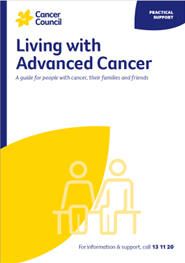- Home
- Cancer Information
- Advanced cancer
- Living with advanced cancer
- Treatment for advanced cancer
Treatment for advanced cancer
The aim of treatment for advanced cancer is to control the cancer for as long as possible. This might mean shrinking the size of the cancer or slowing its growth for a while. In some cases, this may be for months or years. If treatment is no longer controlling the cancer, the aim of treatment may be to help relieve the physical and emotional symptoms of cancer.
Learn more about:
- Overview
- Making treatment decisions
- When treatment seems too much
- Chemotherapy
- Hormone therapy
- Targeted therapy
- Immunotherapy
- Surgery
- Radiation therapy
- Complementary and alternative therapies
- Your healthcare team
- Palliative care
- Rehabilitation
Overview
New treatments are constantly becoming available, so if your current treatment stops working or you are finding it hard to cope with the side effects, ask your doctor what else you can try. Also, ask if you are eligible to join any clinical trials.
Treatment choices for advanced cancer will depend on where the cancer started and how much it has spread. Usually cancer that has spread needs systemic treatment. This means treatment is taken by mouth (orally) or injected into the bloodstream to reach cancer cells throughout the body. Examples include chemotherapy, targeted therapy, immunotherapy and hormone therapy. Treatment that affects only a certain part of the body may also be used to control the cancer or to relieve symptoms. Examples include surgery and radiation therapy.
Often these treatments will be discussed with a range of health professionals (listed on the next two pages) at what is known as a multidisciplinary team (MDT) meeting. You are likely to see a number of health professionals who specialise in different aspects of your care.
Learn more about chemotherapy, surgery, radiation therapy, immunotherapy, targeted therapy and palliative care.
→ READ MORE: Making treatment decisions for advanced cancer
Podcast: Treatment Options for Advanced Cancer
Listen to more of our podcast for people affected by advanced cancer
Dr Lucy Gately, Medical Oncologist, Alfred Health and Walter and Eliza Institute for Medical Research, VIC; Dr Katherine Allsopp, Supportive and Palliative Care Specialist, Westmead Hospital, NSW; A/Prof Megan Best, The University of Notre Dame Australia and The University of Sydney, NSW; Dr Keiron Bradley, Palliative Care Consultant, Medical Director Palliative Care Program, Bethesda Health Care, WA; Craig Brewer, Consumer; Emeritus Professor Phyllis Butow, Psychologist, The University of Sydney and Chris O’Brien Lifehouse, NSW; Louise Durham, Palliative Care Nurse Practitioner Outpatients, Princess Alexandra Hospital, Metro South Palliative Care, QLD; Dr Roya Merie, Radiation Oncologist, ICON Cancer Centre, Concord, NSW; Penny Neller, Project Coordinator, National Palliative Care Projects, Australian Centre for Health Law Research, Queensland University of Technology, QLD; Caitriona Nienaber, 13 11 20 Consultant, Cancer Council WA; Xanthe Sansome, Program Director, Advance Care Planning Australia, VIC; Sparke Helmore Lawyers; Peter Spolc, Consumer.
View the Cancer Council NSW editorial policy.
View all publications or call 13 11 20 for free printed copies.
Need to talk?
Support services
Coping with cancer?
Speak to a health professional or to someone who has been there, or find a support group or forum
Need legal and financial assistance?
Pro bono services, financial and legal assistance, and no interest loans
Cancer information
Dealing with the diagnosis
Common reactions to a cancer diagnosis and how to find hope
Explore our resource hub
Explore and download our booklets, fact sheets, podcasts, webinars and videos for people affected by cancer
